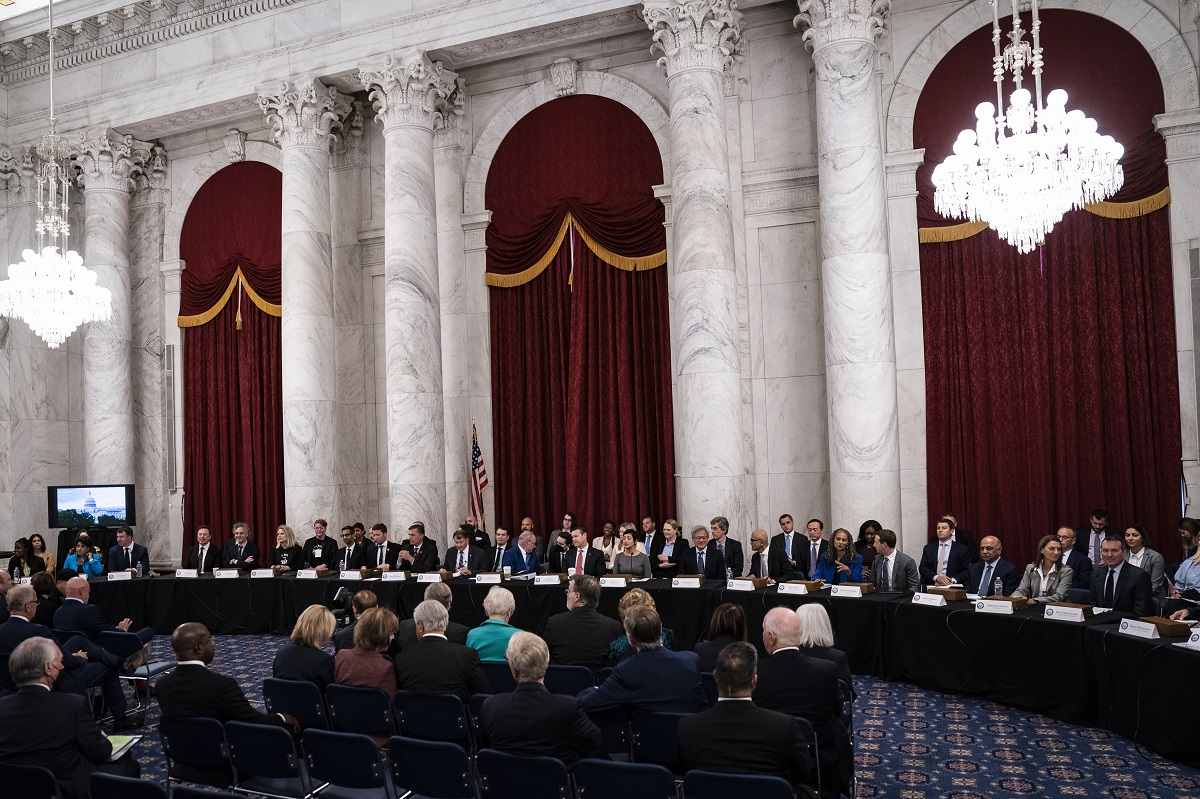
Senate Majority Leader Charles E. Schumer (D-N.Y.) and a bipartisan group of senators will release a long-awaited “road map” for regulating artificial intelligence this week, a sprawling directive that comes nearly a year after Schumer called for an “all hands on deck” push.
12:52 JST, May 14, 2024
A bipartisan group of senators, including Majority Leader Charles E. Schumer, will unveil a long-awaited “road map” this week for regulating artificial intelligence, directing Congress to infuse billions of dollars into research and development of the technology while addressing its potential harms.
The sprawling directive comes almost a year after Schumer called for an “all hands on deck” push to regulate AI, saying that Congress needed to accomplish years of work in months.
While not legislation, the initiative is intended to provide direction to the Senate committees increasingly crafting bills tackling the technology. The plan, which is not yet finalized, reviews a host of issues – including AI’s effect on the military, health care and workers, according to people who have been briefed on the plan, who spoke on the condition of anonymity to discuss the unreleased document. The plan could be made public as soon as Tuesday, one of the people said.
“The road map is still being finalized and should be released shortly,” Schumer spokeswoman Allison Biasotti said in a statement.
The plan is expected to call for about $32 billion in funding for AI research and development, according to people familiar with the plans. The figure is based on a 2021 National Security Commission on Artificial Intelligence report, which called for 1 percent of U.S. gross domestic product to be directed to research and development at agencies including the Department of Energy, National Science Foundation and National Institute of Standards and Technology.
The plan will also call for individual sectors – such as health care – to develop specific rules for AI, as well as for the development of testing and transparency measures that will help explain potential harms of the technology. The document will also include provisions to ensure that the U.S. military stays competitive in AI, tracking adversaries’ progress in developing the technology.
The United States lags far behind Europe and other governments in crafting guidelines for AI, and the road map is intended to spur a wave of legislative activity in Congress. The plan has bipartisan backing, but many observers are skeptical that a deeply polarized legislature will be able to craft comprehensive AI laws during a heated presidential election year.
Meanwhile, U.S. tech companies are forging ahead with ever more powerful AI systems and tools. OpenAI on Monday announced a number of upgrades to ChatGPT, powered by a new model that improve the chatbot’s capabilities to listen and respond by voice. Google is expected to announce AI enhancements to its own products at its Tuesday developer conference.
Schumer has urged the United States to swiftly develop guardrails for AI. A bipartisan group of senators dubbed the “AI Gang” crafted the proposal, including Sens. Martin Heinrich (D-N.M.), Mike Rounds (R-S.D.) and Todd Young (R-Ind.).
The plan is also expected to call for the passage of bipartisan bills that have already been introduced, including the CREATE AI Act, which would establish federal infrastructure for AI research, one of the people said. It also includes provisions to promote training and developing workers for other skills, amid broad concerns about the effect artificial intelligence could have on jobs, another of the people said.
Schumer teased the upcoming plan during an interview last week at the AI Expo For National Competitiveness, where he said that congressional committees will take the lead on recommendations in the document. Some committees will move faster than others, he said. The Rules Committee, helmed by Sen. Amy Klobuchar (D-Minn.), is scheduled Wednesday to consider three bipartisan bills to address the effect of artificial intelligence on U.S. elections.
“Our committees will go to work,” Schumer said. “Some committees are a little further along than others. We’re not going to wait to have one huge comprehensive plan that touches on everything.”
Schumer’s plan is the product of months of meetings among lawmakers, top tech executives, civil rights and labor leaders, consumer protection advocates and researchers, through a series of sessions that he dubbed “insight forums.” In the most high-profile gathering last year, Schumer held a six-hour session with executives locked in fierce competition to direct the future of AI development, including Tesla CEO Elon Musk, Meta CEO Mark Zuckerberg and OpenAI CEO Sam Altman.
Top Articles in News Services
-

Survey Shows False Election Info Perceived as True
-

Hong Kong Ex-Publisher Jimmy Lai’s Sentence Raises International Outcry as China Defends It
-

Japan’s Nikkei Stock Average Touches 58,000 as Yen, Jgbs Rally on Election Fallout (UPDATE 1)
-

Japan’s Nikkei Stock Average Falls as US-Iran Tensions Unsettle Investors (UPDATE 1)
-

Trump Names Former Federal Reserve Governor Warsh as the Next Fed Chair, Replacing Powell
JN ACCESS RANKING
-

Producer Behind Pop Group XG Arrested for Cocaine Possession
-

Japan PM Takaichi’s Cabinet Resigns en Masse
-

Man Infected with Measles Reportedly Dined at Restaurant in Tokyo Station
-

Israeli Ambassador to Japan Speaks about Japan’s Role in the Reconstruction of Gaza
-

Videos Plagiarized, Reposted with False Subtitles Claiming ‘Ryukyu Belongs to China’; Anti-China False Information Also Posted in Japan


























